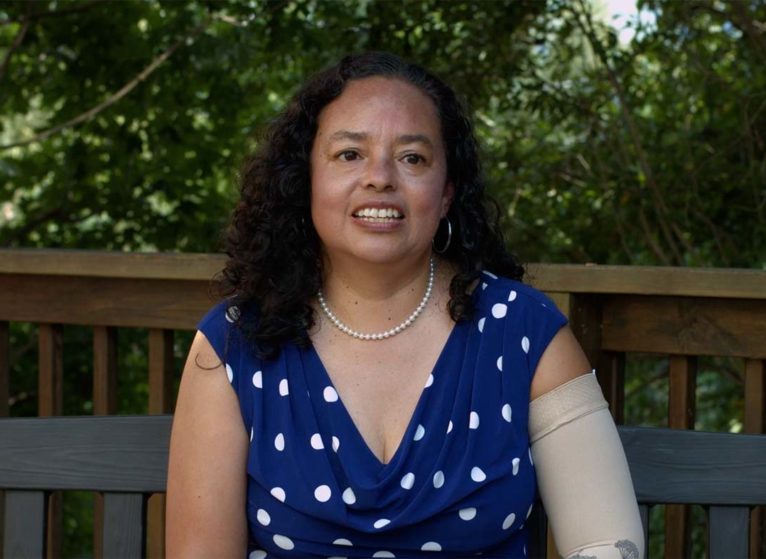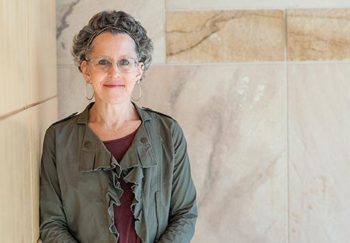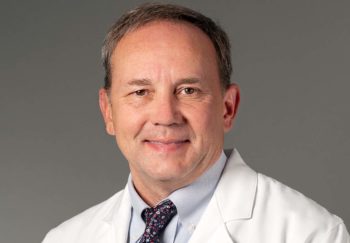When Margarita Figueroa went in for her first mammogram in 2017, she was younger than the recommended age for breast cancer screening. And she had no family history of cancer. But her gynecologist, a breast cancer survivor, urged her to get tested early.
When the results required that she have a second mammogram and a biopsy, Margarita still didn't quite believe it.
"I was just dismissing it. 'Oh, it's a fluke. I don't have any family history. This is not happening.' And I was like that for a little bit, and then I had to go into overdrive mode to figure out how to deal with it."
Seeking a Second Opinion
After a second mammogram and a biopsy, Margarita's provider at the time scheduled a surgery within the next two weeks.
"It seemed very rushed to me," she recalls. "I did some reading and research and it looked like I needed to have other tests."
When her providers weren't receptive to her concerns, she reached out to UVA Health for a second opinion. From the moment Margarita and her husband met with breast surgeon Anneke Schroen, MD, they noticed a change in their experience.
"We didn't feel pushed around. She told me that she wanted to cross all the T's and dot all the I's. She laid out what we needed to do to figure out exactly where the cancer was."
Coming Up With a Better Plan
Dr. Schroen reviewed Margarita's previous tests. "Her initial diagnoses showed something that we consider a risk marker for breast cancer and not an actual breast cancer diagnosis." Plus, Dr. Schroen was concerned that Margarita had received conflicting opinions on previous biopsies.
As with any second opinion at the UVA Breast Care Center, Dr. Schroen presented Margarita's case to a team of experts. "All imaging gets reviewed again by our radiologists who specialize in breast imaging. Pathology gets reviewed again. Then we meet together as a team of multiple specialists to review these tests and to discuss the plan."
Instead of having a surgery that could only help diagnose breast cancer, Dr. Schroen's team was able to fully diagnose the cancer so the surgery could be focused on treatment. With the help of plastic reconstructive surgeon Chris Campbell, MD, Margarita would have a full mastectomy and breast reconstruction on the same day.
BREAST CANCER SCREENING
If you're a woman, you have a 1 in 8 chance of getting breast cancer.
Returning Home to New Challenges
Margarita's mastectomy and breast reconstruction surgery had been a success, but a long road was still ahead. Because of having an autologous reconstruction (where they removed fat from her own body), she had drains attached to her body. She wasn't able to drive, get around easily, or hug her children.
Margarita met with breast oncologist Patrick Dillon, MD, to discuss treatment. Although she was relieved not to have to undergo chemotherapy, she found radiation therapy to have its own challenges; mentally and emotionally.
"Physically, the lowest point was when I came back from surgery and I couldn't do very much. But mentally, the lowest point was in the middle of radiation," she remembers.
During radiation therapy, Margarita was sleeping 12 hours a day without an appetite. Meanwhile, a host of life, work, and family issues continued to pile up. While her husband was traveling, Margarita was in a car accident. That same week, she received news of her mother being hospitalized in Mexico.
Her radiation oncologist Einsley Janowski, MD, noticed a new sadness in Margarita that was compounded by the ongoing stresses of life. After they talked about the causes of her stress, Dr. Janowski referred Margarita to psychologist Kim Penberthy, PhD.
With Dr. Penberthy, Margarita was able to learn the techniques that could help manage her thoughts and feelings, and re-center how she perceives her challenges.
Helping Others
Margarita had always been an active volunteer in her community, which is something that had paused with her cancer diagnosis.
Later in her journey, Dr. Dillon suggested she consider the Cancer Center Peer Support Program at UVA. Remembering the questions and struggles she faced after her initial diagnosis, Margarita saw the peer support program as an opportunity to help others.
As a peer partner, not only has she been able to offer guidance and an open ear to cancer patients, she has gained a community of others with similar experiences. A guiding message she has shared is the importance of self-advocacy and self-care.
"There are too many appointments one has to go to, and not enough time. Really, one has to stop that and take care of yourself. That's one of the things that I had to learn. I cannot do all these things. I had to take care of myself first."
Watch Margarita's story.
MARGARITA MARTINEZ FIGUEROA: I went to get my first mammogram at the urging of my gynecologist. She was very insistent that I had a baseline mammogram and that's how I discovered other things after that.
MAYA FIGUEROA: She had done a test and it had come up that she has breast cancer. It was the first stage breast cancer.
NATHAN SWAMI: We were told that she may need to do surgery and so I next thought it would be more of a lumpectomy. But the doctor at that time gave us a lot of mixed signals.
PATRICK DILLON: Margarita is a patient who chose to have a second opinion at the University of Virginia.
ANNEKE SCHROEN: In Margarita's case, I believe the second opinion really changed the course of her treatment and how that was approached. In her case, based on what was happening in the breast, the best choice was a mastectomy. This was then combined with one of our plastic surgeons who performed an immediate flap reconstruction using some of her own tissue.
When she went to the operating room, we were already able to perform a surgery directed at treating breast cancer as opposed to a surgery that could only help diagnose a breast cancer.
MARGARITA MARTINEZ FIGUEROA: I had a mastectomy and reconstruction on the same day.
PATRICK DILLON: So I think Margarita has a great attribute of being willing to ask questions. She's not afraid to ask what's going on and why are you recommending this treatment? And she was also willing to share some of her struggles, and so being willing to share what's going on both with your treatment and with your personal life I think improves the chances that we're going to be able to help you through a cancer journey.
MARGARITA MARTINEZ FIGUEROA: Physically, the lowest point was when I came back from surgery and I couldn't do very much. But mentally, the lowest point was in the middle of radiation. Everything seemed to be just piling up, so it just felt too much. My body was already so tired and then all these things just kept piling up.
MAYA FIGUEROA: So we would try to spend time with her, but at the same time we were also really worried about what would happen.
J. KIM PENBERTHY: When I was working with Margarita, it became clear that she had a lot of anxiety about her symptoms and what might happen in the future. So we worked on strategies to help her reduce her anxiety.
MARGARITA MARTINEZ FIGUEROA: Having techniques for when things are becoming too much, being overwhelmed, having ways to cope with that and not feeling down by everything that's happening. When I was first diagnosed, I looked for answers and support also from other friends who are survivors of breast cancer or other types of cancer just to have ideas on what things were going to be. And when I saw the opportunity on one of my appointments to Dr. Dillon to become a peer partner, I jumped into that right away because it felt like a natural way of volunteering.
NATHAN SWAMI: I'm very proud of her doing this work, talking to cancer patients and having an opportunity to in some ways be the listener, be a counselor. The two things we always wanted to do and especially her, we all want to have an impact. And two, we always want to learn. She's learning through the experience of others.
MAYA FIGUEROA: After the whole thing that happened with my mom, I've started to love her even more and really feel closer to her than ever.
MARGARITA MARTINEZ FIGUEROA: Having cancer changes the way you see everything.


